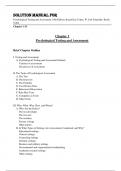Solution MANUAL For Psychological Testing and Assessment, 10th Edition, Ronald Jay Cohen, W. Joel Schneider, Renée Tobin Chapter 1 -15 Chapter 1 Psychological Testing and Assessment Brief Chapter Outline I. Testing and Assessment A. Psychological Testing and Assessment Defined Varieties of assessment The process of assessment II. The Tools of Psychological Assessment A. The Test B. The Interview C. The Portfolio D. Case History Data E. Behavioral Observation F. Role -Play Tests G. Computers as Tools H. Other Tools III. Who, What, Why, How, and Where? A. Who Are the Parties? The test developer The test user The testtaker Society at large Other parties B. In What Types of Settings Are Assessments Conducted, and Why? Educational settings Clinical settings Counseling settings Geriatric settings Business and military settings Governmental and organizational credentialing Academic research set tings Other settings C. How Are Assessments Conducted? Assessment of people with disabilities D. Where to Go for Authoritative Information: Reference Sources Test catalogues Test manuals Professional books Reference volumes Journal articles Online database s Other sources Close -up: Behavioral Assessment Using Smartphones Meet an Assessment Professional: Meet Dr. Alan Ogle Everyday Psychometrics : Everyday Accommodations Self-Assessment References A Term to Learn Therapeutic psychological assessment: It is a collaborative approach to assessment in which therapeutic self -discovery and new understandings are encouraged throughout the assessment process. Some Relevant Reference Citations Finn, S. E. (2011). Therapeutic assessment ―on the front lines‖: Com ment on articles from WestCoast Children‘s Clinic. Journal of Personality Assessment, 93(1), 23 –25. Ougrin, D., Zundel, T., Kyriakopoulos, M., et al. (2012). Adolescents with Suicidal and Nonsuicidal Self-Harm: Clinical Characteristics and Response to The rapeutic Assessment. Psychological Assessment, 24(1), 11 –20. Smith, R. E., Fagan, C., Wilson, N. L., et al. (2011). Internet -Based Approaches to Collaborative Therapeutic Assessment: New Opportunities for Professional Psychologists. Professional Psycholog y: Research and Practice, 42(6), 494 –504. For Class Consideration Dr. Stephen Finn and his colleagues (Finn, 2003, 2009, 2011; Finn & Martin, 1997; Finn & Tonsager, 2002; Fischer & Finn, 2014) have described a collaborative approach to assessment called therapeutic psychological assessment . In this type of assessment , results are not revealed at the end but shared immediately so that both the assessor and the assessee can codevelop an interpretation of the results and decide what questions require further assessment. But is this approach useful for every assessee? Is every professional who conducts an assessment suited for conducting therapeutic assessment? Under what conditions would therapeutic psychological assessment not be indicated? Class Discussion Questions Here is a list of questions that may be used to stimulate a class discussion as well as critical and generative thinking with regard to some of the material presented in this chapter of the text. 1. What is the role of measurement in society? 2. How does your answer to question one change when it is applied to the role of psychological measurement in society? 3. What psychological test needs to be developed? a. Why does this test need to be developed? b. What would this new test measure? c. How would this new test measure what it measures? d. For what purpose(s) would this new test be used? e. In what setting(s) would this new test be used? 4. What do you consider to be the characteristics of a ―good‖ test and a ―bad‖ test? 5. What is the difference between psychological testing and psychological assessment? 6. What is meant by an alternate assessment, and why is there a need for it? 7. In your view, what are the purposes of using psychological tests today? 8. As a follow -up to question seven , discuss your view on how psycholog ical tests could ideally be used to the best advantage. Elaborate on this with respect to the use of tests in the following settings: a. Schools b. Clinical and counseling settings c. The business world d. Other settings 9. Have you ever been interviewed? a. Why have you b een interviewed? b. How would you characterize the interviewer who interviewed you? c. What are the characteristics of a good interviewer? d. What are the characteristics of a good interview? 10. Discuss your views on psychological assessment with regard to the follow ing tools of assessment. a. Tests b. Portfolio assessment c. Performance -based assessment d. Case history e. Behavioral observation f. Role -play tests g. Computerized assessment h. Assessment using simulations or video 11. Who are the parties to the assessment enterprise, and what a re their roles? In your view, what should be the role(s) of these parties? 12. Tests are used in credentialing. In general, what key elements do you think should be included in any test designed to license a psychological test user? 13. Why is it important to ha ve published standards for educational and psychological tests? What are some of the abuses that the standards are intended to prevent? 14. Describe a test experience you personally had that stands out for some reason? Why does it stand out? 15. For more routine test situations, such as academic achievement tests in school, answer the following questions: a. How do you prepare for tests? b. How do you feel during and after the test? c. Analyze the factors that may contribute to the feelings you listed. In-Class Demonstra tions 1. Bring Something to the Class. Bring test -related reference materials such as the following to the class: a. A sample copy of Mental Measurements Yearbook (MMY ) Bring a copy of the latest edition of MMY to the class. b. A sample copy of Tests in Print Bring a copy of Tests in Print to the class. c. A sample test manual




